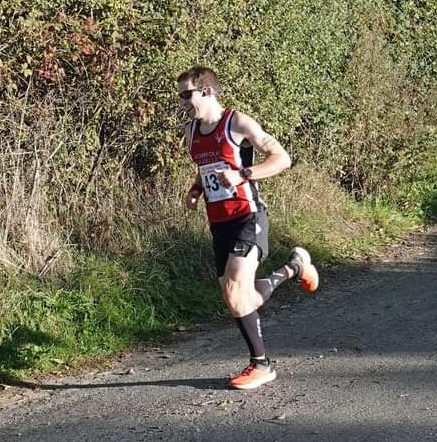When your target marathon is done, you may well be chomping at the bit to go and run some shorter, fast races. Here’s what to expect and some tips to make sure you’re getting the best out of yourself.
When to next race
How quickly do you tend to bounce back from a marathon? For my first few, I felt back to normal, and was able to put in surprising PBs, within 2-3 weeks of a marathon. As I’ve run faster marathons, partly through harder effort on the day no doubt, it takes that bit longer for the legs to feel they have the same oomph. The image for this blog was taken during the Blickling Half Marathon, 2 weeks after the London marathon, running with a comfortable heart rate but incredibly heavy legs.
Generally I suggest at least a 3 week break between a marathon and your next race. It should be enough for you to recover, and perform well in the shorter distance, and it gives you time to find your feet at faster paces.
How to get back to racing
I’d recommend a couple of easy weeks of training sessions after your marathon. One week of very low mileage, likely having taken 2-3 days of walking or cycling instead of running, and running around 8-10 miles by the weekend (6-7 days post-marathon).
Week two might then include a couple of shorter progression or pyramid sessions around 9-11 days post marathon, with a longer run of 10-13 miles by the weekend, potentially including some at marathon pace.
The third week is where you sharpen up for your next race. If you’re heading into a 5k or 10k next, some 400-600m reps at target pace with either 45-60 seconds static recovery or jog recoveries of 400-600m would be a good plan. For anything above 10k, slightly longer reps of 600-800m would be a good plan, with 60-90 secs static recoveries or 600-800m of easy jog recoveries.
In these sharpening sessions, the best option depends on your overall fitness/speed more than anything else. These are only guidelines, so if you feel you need more time to recover, take it. You’ll still be bouncing back from your marathon, and your next race is the priority. The whole purpose of these sessions is to familiarise yourself with the pace, whilst keeping the sessions and reps short enough in duration/distance so you still continue to recover for the next race.
Longer layoffs
You might be a little less keen to get racing again, or just need some downtime with family after the time consuming nature of marathon training. If this is the case, take as much time as you need before lacing up for a full out race. The only caveat I’d give is to get that race booked sooner rather than later, even if it’s a couple of months away. Outside of my coaching, I’ve seen countless people training their backsides off for a marathon, they run really well, collecting PBs in races along the way (some of which often arguably weren’t the best idea), only to let it all go and slip away once the marathon’s done. More often than not, they then feel sluggish and blame the marathon for making them slow, which couldn’t be further from the truth.
Try not to completely stop running once your marathon is over. Get some runs with friends in the diary to keep you motivated.
Begin periodisation
If you’re someone who prioritises the marathon as your preferred distance, then periodisation of your training is key to your progress. The chances are, even before your target marathon, you’ve picked out the next one, or at least have a good idea of when the next block of speed work will be starting and how long it’ll last for before you head into marathon training again.
With that in mind, think about where your strengths lay, and consider working on your weaknesses. If you feel you’re a “one pace wonder”, then a specific period of training to run faster and activate the fast twitch muscle fibres might prove very useful, leading to more 5k-10k races. If you’ve got a good range of speeds, but can’t sustain the slower paces for long races, focusing on some half marathons would be a clever tactic.
I’ve used both of these strategies in my own training and in that of my training plan and coaching clients to great effect.
Get stuck in checklist
- Consider your future targets.
- Pick a race and a realistic range of target times to aim for.
- Plan your runs between these races.
- Execute that plan.
- Race well and progress.
As always, there is no “best” approach, since we’re all so different in our goals and abilities, but I hope you’ve found the points I’ve discussed helpful in determining what to do next.
Written by Kyle Brooks, Running Coach based in Norwich, Norfolk

